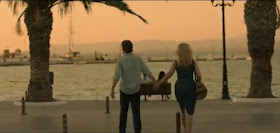WHO: Richard Linklater directed and co-wrote, with his lead actors Julie Delpy and Ethan Hawke, this feature.
WHAT: What started out as nothing more than a particularly fortuitous mid-nineties Indiewood feature (Before Sunrise) and nine years later became an audacious experiment in sequelization (Before Sunset) is now, with Before Midnight, well on its way to turning into a monumental reinvention of that long-buried, little-regarded cinematic genre: the Saturday matinee serial. Only these films aim at adult audiences, feature more talk than action (or perhaps it's more accurate to say talk as action), and neither compress nor extend time between one episode's cliffhanger and the next's opening moment, but rather allow the audience and the actors as long to wonder what's befallen beloved characters Celine (Delpy) and Jessie (Hawke) in each nine-year interim. So real does this snapshot-moment approach feel, that most critics bypass making comparisons to Pearl White or Buster Crabbe, and head straight to Michael Apted's 49-year, 8-segment (and counting) documentary epic the "Up Series" when making cinematic comparisons in their reviews.
I found Before Midnight to be an incredibly satisfying part three in this (so far) trilogy; it keeps the spirit of the originals (neither of which I've revisited in more than brief clips since 2004) while making some serious structural departures that feel like perfectly logical extensions of the project. But I don't feel I have the words in me to write a review that truly does justice to the achievement here. So instead I'll link to the film's Metacritic page, wherein you'll find plenty of other reviews by some of the country's better critics. I'll note they range from the mostly positive to the wholly positive; I haven't seen any well-argued pans of Before Midnight yet.
WHERE/WHEN: Screens multiple times daily at various screens around Frisco Bay this week, including the Embarcadero, Shattuck, Kabuki, Sequoia, Guild, and Camera 7 Theatres.
WHY: You should know, if you haven't already figured it out, that Linklater is not just a filmmaker but a real cinephile. In the 1980s he co-founded the Austin Film Society and befriended one of the real titans of American experimental film, James Benning; this friendship is the subject of a currently-in-production film by one of the smartest young cinephiles around, Gabe Klinger.
Linklater's devotion to the underseen masterpieces of cinema history is well-documented as well; he recently had a piece on Vincente Minnelli's Some Came Running published in a book and excerpted in Movie City News (that film screens the Stanford Theatre this Thursday & Friday). Another Minnelli film The Clock came up as an acknowledged influence on the "Before Trilogy" in his on-stage appearance at the San Francisco International Film Festival with Julie Delpy and Mike Jones a month ago. (And a lovely clip from it came up in Christian Marclay's The Clock during the early, coffee drinking hours of the installation.)
Delpy was on the verge of revealing another classic film influence on the trilogy, and on Before Midnight in particular, during that SFIFF conversation, but was pulled back by her director, who apparently wanted to keep it a surprise for the audience, most of which had not seen their film yet but would the following night at the fest's designated closing screening. In that spirit I won't reveal the title on this blog other than by linking to the Castro Theatre and Rafael Film Center pages for its upcoming screenings at those venues. So click if you've already seen Before Midnight or don't mind having one of its cinephile references spoiled in advance.
HOW: I believe Before Midnight, the first in Linklater's/Delpy's/Hawke's trilogy to have been shot digitally, is only available to screen as a DCP right now.

Brian: I was intrigued by your comparison to action serials though a closer analogy may be the series Old Hollywood made with couples- Gaynor/Farrell, Loy/Powell, Hepburn/Tracy- who audiences would return to see in new stories. Sometimes, as here or in the throwaway late Thin Man entries, the recoupling brings diminishing returns.
ReplyDeleteI'm sorry I side with Richard Brody here, I found the backstory to the movie more interesting than the characters. A test scene is
after the meal where they walk past some unidentified Greek ruins, which I was curious to know more about, but no the director and cameraman blurred them and foregrounded the banal dialogue,as the story progressed they became as obnoxious to me as you found the characters in "The Color Wheel."By the time of their long Sturm Und Drang in the hotel they had lost me.
It was nice to see veteran cinematographer Walter Lassaly (as Patrick) a reminder of when movies, shot on celluloid, looked beautiful. The house belonged to a real Patrick, the British travel writer Patrick Leigh Fermor, whose adventure in Crete inspired the Powell/Pressburger Ill Met By Moonlight.
Well, I'm not convinced by either your or Brody's complaints. Did you find the dialogue more banal here than in the first two films?
ReplyDeleteBut you're not alone; I spoke to a SFIFF volunteer who had loved the first two and found this one very disappointing- almost a betrayal it seemed, from the tone of her voice- when she saw it at the Castro.
It's been a while since I've seen the first two, don't care to revisit right now. I wanted to like this movie, but....On the other hand I went into Frances Ha wary from the cutesy trailer and skeptical of the fake black and white and the recycled Truffaut music. And yet my spirits were lifted by its bouyant charms.
ReplyDelete